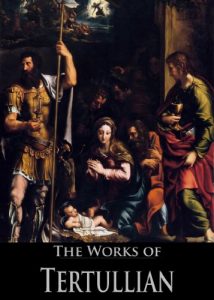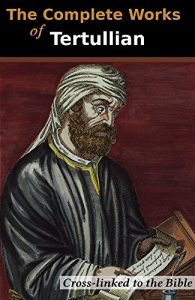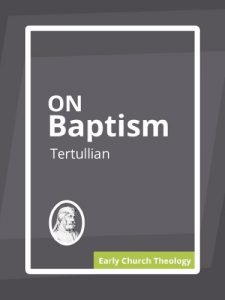This collection gathers together all of the works by Tertullian in a single, convenient, high quality, and extremely low priced Kindle volume!
Of Patience
The Passion of the Holy Martyrs Perpetua and Felicitas
Ad Martyras
On Prayer
On Baptism
On Repentance
Against all Heresies
Scorpiace. Antidote for the Scorpion's Sting
Against Praxeas; In Which He Defends, in all Essential Points, the Doctrine of the Holy Trinity
On the Resurrection of the Flesh
On the Flesh of Christ
Against the Valentinians, In Which the Author Gives a Concise Account of, Together with Sundry Caustic Animadversions on, the Very Fantastic Theology of the Sect
Against Hermogenes: Containing an Argument Against His Opinion that Matter is Eternal
The Five Books Against Marcion
The Prescription Against Heretics
On the Soul
An Answer to the Jews
The Soul's Testimony
Ad Nationes
Tertullian To Scapula
The Chaplet, or De Corona.
The Shows, or De Spectaculis
On Idolatry
The Apology
On Fasting, In Opposition to the Psychics
De Fuga in Persecutione
On Modesty
On Monogamy
On Exhortation to Chastity
Tertullian To His Wife
On the Veiling of Virgins
On the Apparel of Women
On the Pallium
ABOUT THE AUTHOR:
Quintus Septimius Florens Tertullianus, anglicised as Tertullian, was a prolific early Christian author from Carthage in the Roman province of Africa. He is the first Christian author to produce an extensive corpus of Latin Christian literature. He also was a notable early Christian apologist and a polemicist against heresy. Tertullian has been called "the father of Latin Christianity" and "the founder of Western theology." Though conservative, he did originate and advance new theology to the early Church. He is perhaps most famous for being the oldest extant Latin writer to use the term Trinity (Latin trinitas), and giving the oldest extant formal exposition of a Trinitarian theology. Other Latin formulations that first appear in his work are "three Persons, one Substance" as the Latin "tres Personae, una Substantia" (itself from the Koine Greek "treis Hypostases, Homoousios"). He wrote his trinitarian formula after becoming a Montanist; his ideas were at first rejected as heresy by the church at large, but later accepted as Christian orthodoxy.
Of Patience
The Passion of the Holy Martyrs Perpetua and Felicitas
Ad Martyras
On Prayer
On Baptism
On Repentance
Against all Heresies
Scorpiace. Antidote for the Scorpion's Sting
Against Praxeas; In Which He Defends, in all Essential Points, the Doctrine of the Holy Trinity
On the Resurrection of the Flesh
On the Flesh of Christ
Against the Valentinians, In Which the Author Gives a Concise Account of, Together with Sundry Caustic Animadversions on, the Very Fantastic Theology of the Sect
Against Hermogenes: Containing an Argument Against His Opinion that Matter is Eternal
The Five Books Against Marcion
The Prescription Against Heretics
On the Soul
An Answer to the Jews
The Soul's Testimony
Ad Nationes
Tertullian To Scapula
The Chaplet, or De Corona.
The Shows, or De Spectaculis
On Idolatry
The Apology
On Fasting, In Opposition to the Psychics
De Fuga in Persecutione
On Modesty
On Monogamy
On Exhortation to Chastity
Tertullian To His Wife
On the Veiling of Virgins
On the Apparel of Women
On the Pallium
ABOUT THE AUTHOR:
Quintus Septimius Florens Tertullianus, anglicised as Tertullian, was a prolific early Christian author from Carthage in the Roman province of Africa. He is the first Christian author to produce an extensive corpus of Latin Christian literature. He also was a notable early Christian apologist and a polemicist against heresy. Tertullian has been called "the father of Latin Christianity" and "the founder of Western theology." Though conservative, he did originate and advance new theology to the early Church. He is perhaps most famous for being the oldest extant Latin writer to use the term Trinity (Latin trinitas), and giving the oldest extant formal exposition of a Trinitarian theology. Other Latin formulations that first appear in his work are "three Persons, one Substance" as the Latin "tres Personae, una Substantia" (itself from the Koine Greek "treis Hypostases, Homoousios"). He wrote his trinitarian formula after becoming a Montanist; his ideas were at first rejected as heresy by the church at large, but later accepted as Christian orthodoxy.








